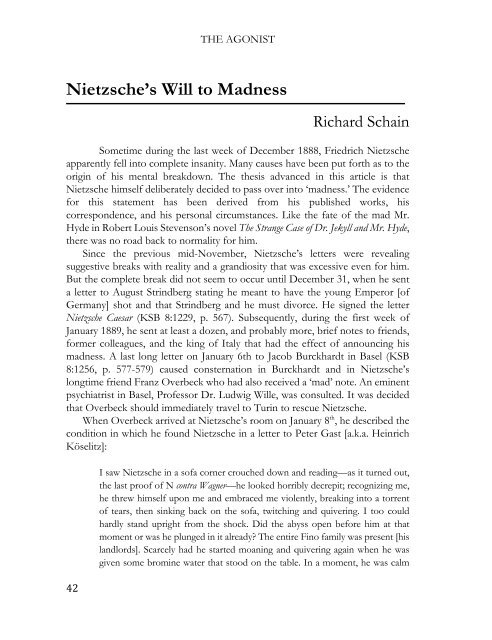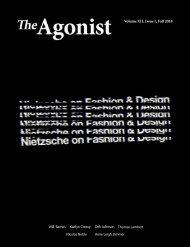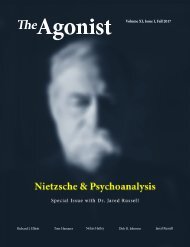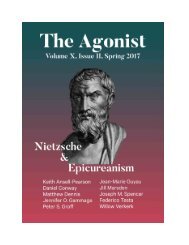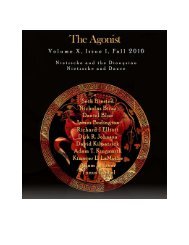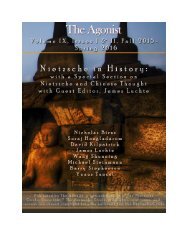Volume XII, Issue II, Spring 2019
Create successful ePaper yourself
Turn your PDF publications into a flip-book with our unique Google optimized e-Paper software.
THE AGONIST<br />
Nietzsche’s Will to Madness<br />
42<br />
Richard Schain<br />
Sometime during the last week of December 1888, Friedrich Nietzsche<br />
apparently fell into complete insanity. Many causes have been put forth as to the<br />
origin of his mental breakdown. The thesis advanced in this article is that<br />
Nietzsche himself deliberately decided to pass over into ‘madness.’ The evidence<br />
for this statement has been derived from his published works, his<br />
correspondence, and his personal circumstances. Like the fate of the mad Mr.<br />
Hyde in Robert Louis Stevenson’s novel The Strange Case of Dr. Jekyll and Mr. Hyde,<br />
there was no road back to normality for him.<br />
Since the previous mid-November, Nietzsche’s letters were revealing<br />
suggestive breaks with reality and a grandiosity that was excessive even for him.<br />
But the complete break did not seem to occur until December 31, when he sent<br />
a letter to August Strindberg stating he meant to have the young Emperor [of<br />
Germany] shot and that Strindberg and he must divorce. He signed the letter<br />
Nietzsche Caesar (KSB 8:1229, p. 567). Subsequently, during the first week of<br />
January 1889, he sent at least a dozen, and probably more, brief notes to friends,<br />
former colleagues, and the king of Italy that had the effect of announcing his<br />
madness. A last long letter on January 6th to Jacob Burckhardt in Basel (KSB<br />
8:1256, p. 577-579) caused consternation in Burckhardt and in Nietzsche’s<br />
longtime friend Franz Overbeck who had also received a ‘mad’ note. An eminent<br />
psychiatrist in Basel, Professor Dr. Ludwig Wille, was consulted. It was decided<br />
that Overbeck should immediately travel to Turin to rescue Nietzsche.<br />
When Overbeck arrived at Nietzsche’s room on January 8 th , he described the<br />
condition in which he found Nietzsche in a letter to Peter Gast [a.k.a. Heinrich<br />
Köselitz]:<br />
I saw Nietzsche in a sofa corner crouched down and reading—as it turned out,<br />
the last proof of N contra Wagner—he looked horribly decrepit; recognizing me,<br />
he threw himself upon me and embraced me violently, breaking into a torrent<br />
of tears, then sinking back on the sofa, twitching and quivering. I too could<br />
hardly stand upright from the shock. Did the abyss open before him at that<br />
moment or was he plunged in it already? The entire Fino family was present [his<br />
landlords]. Scarcely had he started moaning and quivering again when he was<br />
given some bromine water that stood on the table. In a moment, he was calm


